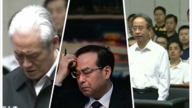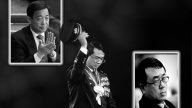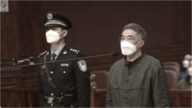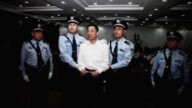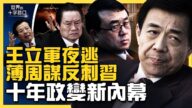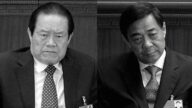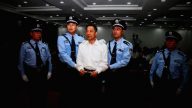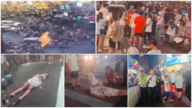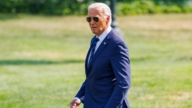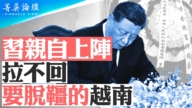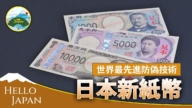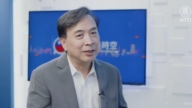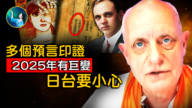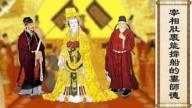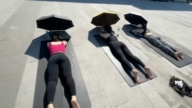【新唐人2012年4月11日讯】因为1989年六四天安门事件而流亡美国22年的中国物理学家方励之,4月6号在美国亚利桑那州家中去世,享年76岁。天安门事件之后,方励之夫妇到驻北京的美国大使馆避难一年多,直到中共当局允许他和他的家人离境。然而对比今年二月初重庆副市长王立军的美领馆庇护之路,王立军则是被中共当局带回调查。
方励之因为六四民主运动被镇压之后,进入北京的美国驻华使馆,并在那里停留了很长一段时间。有媒体对比分析,两个月前同样寻求美国领馆政治庇护的王立军,就没有如此幸运了。
《美国之音》4月9号报导,方励之和王立军事件相同之处,他们都是以“特殊”方式进入美国领馆,不同之处是,王立军只停留了一天,遭到拒绝后自动离开,被中南海带走进行“调查”,而方励之则得到了批准,在美国领馆中停留了384天,最终成功来到美国。
六四天安门学生领袖项小吉:“那么比较这两个案子,这个区别非常大,方励之先生对89民主运动有深刻的影响,而且在89年共产党血腥镇压他有生命危险,在这种背景下美国政府庇护他,而王立军他这个事情没有任何历史背景,从他个人来讲,大家也搞不清他有什么危险,所以美国政府的处置,我觉得还是符合国际法规定的。”
方励之和王立军,他们曾经都是共产党员,也是在中国境内,唯一进入美国驻华领馆寻求政治庇护的两位中共高级干部。不同的是,王立军是副部级高干,现任共产党员﹔而方励之则是因所谓“资产阶级自由化”而被邓小平开除了党籍的前“中国科技大学”副校长。
中国问题研究专家赵远明表示,方励之在国内一直是反对独裁政权,而王立军根本不是民主人士,他只是中共内部的一个得力的干将,就是在“唱红打黑”时的主要打手。
中国问题研究专家赵远明:“方励之是一个民主人士,王立军是一个中共政权内部的一个打手,这是第一点很明显的不同,第二点呢,方励之之所以寻求庇护,是因为在六四当中,他支持学生运动,王立军你看他历史可以看哪,他根本就没有民主意识,因为他本身就是中共集团的一个成员,他在统治过程当中得到他所需要的名利、地位、职务。”
在这两起寻求庇护事件中,美国领馆接受追求民主自由的知识份子——方励之的政治庇护要求,而拒绝卷入王立军的“中共高官权力斗争”的政治庇护要求。
中国问题研究专家赵远明:“当然我觉得美国领馆拒绝他(王立军)的申请还是有道理的,也就是他认为王立军根本不是一个民主人士,只是党内斗争当中的一个牺牲品,在他为了保命的情况下,他才向美国政府申请庇护,在政治上来讲,他没有什么可以庇护的道理。”
赵远明还表示,王立军跟方励之最大的不同,就是王立军知道中共是不按牌理出牌,不按法律规定办事,做为中共内部的成员,他知道在出现利益冲突的时候,他是得不到法律上的保护或者是长官的庇护,所以他才不得不选择美国领馆作为一个保命的选择。
采访/常春 编辑/黄亿美 后制/郭敬
==================
Wang Lijun and Fang Lizhi: Seeking Asylum Road to U.S.
Fang Lizhi, a physicist who was exiled in the U.S. for 22
years after the 1989 Tiananmen Massacre, has died at his home in Arizona, U.S. on April 6, at the age of 76.
After the Tiananmen Incident, Fang and his wife had stayed
for more than one year at the U.S. embassy in Beijing until the CCP allowed him and his family to leave.
Wang Lijun, Chongqing Vice Mayor, also entered the U.S.
Consulate for asylum in early February this year.
However, the CCP removed him from the Consulate
for further investigation.
Fang Lizhi entered into the U.S. Embassy in Beijing after
the June 4th democracy movement was suppressed.
He stayed there for a long time.
Some media made a comparative analysis between
his case and that of Wang Lijun.
Two months ago, Wang entered into the U.S. consulate
for asylum. However, he was not as fortunate as Fang.
Voice of America reported on April 9 about the common
parts of Fang and Wang event.
Both of them entered into U.S. embassies or consulates
through a special way.
However, the difference is that Wang stayed for one day
and left after his application was rejected.
Fang had stayed for 384 days with permission.
Wang was taken by CCP for further investigation
and Fang went to the U.S. successfully.
Xiang Xiaoji, a student leader in the Tiananmen Incident
commented. “So let’s compare the two cases—there are many differences.
Mr. Fang had a profound effect on the 89 pro-democracy
movement, and he had his life-threatened in the bloody suppression in 1989.
The U.S. government sheltered him in such a context.
However, there is no historical background in Wang’s case.
For him, we were all confused on what kind of risks
he might meet.
So I think the rejection by the U.S. government
is in line with international law.”
Both Fang and Wang were CCP members, and they are
the only two senior party cadres who entered into U.S. embassies or consulates in China for asylum.
Wang is a vice ministerial level senior cadre
and he is an incumbent member of CCP.
Fang was the former Vice Rector at the University
of Science and Technology of China.
He was expelled from the CCP by Deng Xiaoping
due to the so called “bourgeois liberalization”.
Zhao Yuanming, a research expert on China issues said,
Fang had always opposed to the dictatorship in China,
while Wang was not a democrat at all.
Wang was an effective go-getters within CCP and
he was the main hatchet man in “Sing Red and Strike Black” movement.
Zhao Yuanming: “Fang is a democrat while Wang
is a hatchet man.This is the main difference between them.
Besides, Fang requested for asylum as he supported
the students movement in June 4 Incident.
However, from a historical point of view, Wang does not
have any sense of democracy.
Wang is a member of the CCP group; he got fame, better
status and higher positions during the ruling process.”
For the two cases, U.S. embassies or consulates accepted
the asylum application of Fang, who is an intellectual standing for democracy and freedom.
However, they rejected Wang’s application, which was
involved in the power struggles among CCP senior officials.
Zhao Yuanming: “Of course, I think it is reasonable that
the U.S. consulate refused his (Wang Lijun’s) application.
It means Wang is not recognized as a democrat.
He is only a victim of the inner CCP struggle.
He wanted to save his life based on the asylum application.
Politically speaking, he is not deserved of U.S. asylum.”
Zhao Yuanming also said that the main difference between
Wang and Fang is that Wang knows that the CCP plays according to a game of cards.
As in a member of the CCP, he knows that he cannot get
legal protection or executive shelter when an interest conflict appears.
That is why he had to choose the U.S. embassy
or consulate for protecting his life.



